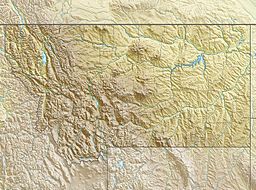Lake Sherburne facts for kids
Quick facts for kids Lake Sherburne |
|
|---|---|
 |
|
| Location | Glacier National Park (U.S.), Glacier County, Montana |
| Coordinates | 48°49′42″N 113°31′16″W / 48.82833°N 113.52111°W |
| Type | Manmade |
| Primary inflows | Swiftcurrent Creek |
| Primary outflows | Swiftcurrent Creek |
| Basin countries | United States |
| Max. length | 6 mi (9.7 km) |
| Max. width | .8 mi (1.3 km) |
| Surface elevation | 4,788 ft (1,459 m) |
Lake Sherburne is a large lake found in the Many Glacier area of Glacier National Park. This park is located in the state of Montana, United States. Lake Sherburne is actually a reservoir, which means it's a lake created by people. It was formed by the Lake Sherburne Dam, which holds back the waters of Swiftcurrent Creek.
Contents
How Lake Sherburne Was Made
The Lake Sherburne Dam was built between 1914 and 1921. When the dam was finished, it flooded several smaller lakes. It also covered many natural wet areas and riverbanks. Because the water level in the lake changes a lot, not many plants can grow right along its edges.
This reservoir is super important for farming. It stores water for the Milk River Project. This project helps provide water for farms in north central Montana.
Who Was Joseph Sherburne?
The lake is named after an early settler and businessman named Joseph H. Sherburne. He moved to the area around 1896. Joseph owned the Sherburne Mercantile Company. This company had stores in towns like Browning, Babb, and East Glacier.
Joseph and his family used to spend summers in a cabin by some small lakes. These lakes were known as Sherburne Lakes (plural). After the dam was built in 1919, the new, bigger lake was named Lake Sherburne.
Animals You Might See
Even though not many plants grow right by the lake, you can still spot some cool animals! Trumpeter swans are often seen here. They visit the lake during spring and fall. These large, beautiful birds are a real treat to watch.
Fishing at Lake Sherburne
Fishing in Lake Sherburne can be a bit tricky. It's not known for being the best fishing spot. However, you might catch brook trout and northern pike here.
It's usually best to use a boat if you want to fish. There isn't a special dock for boats on the lake. So, people often park their cars by the road. Then, they walk down to the water's edge to launch their boats.
 | Laphonza Butler |
 | Daisy Bates |
 | Elizabeth Piper Ensley |



